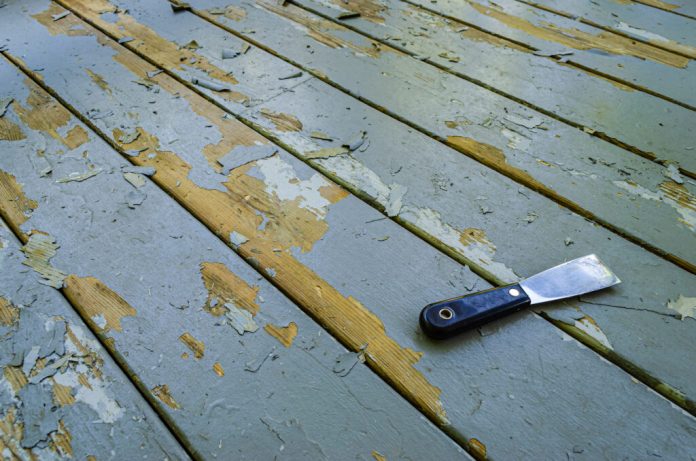Two Wisconsin bills remediating lead paint were passed by the Senate and the state assembly on Wednesday.
The Wisconsin Senate passed two housing laws on Wednesday to expand eligibility for homes renovated with loans from the Wisconsin Housing and Economic Development Authority and to establish a revolving loan fund program to redevelop homes on state highways. Both bills will be presented to the governor on Friday and are part of a package of bipartisan affordable housing bills.
Both bills allow property owners to apply for loans that can be used to remove lead paint and asbestos and to remediate internal plumbing, many of which houses in Wisconsin contain lead piping.
The bills are “important steps” toward safer housing, as lead affects children in all 72 counties of Wisconsin, Beth Swedeen, executive director of the Wisconsin Board for People with Developmental Disabilities, said in a statement.
“Lead poisoning is a 100% preventable cause of intellectual and developmental disabilities, and lead paint is the leading cause of lead poisoning.” These bills are important steps toward making more homes safer. In every county in Wisconsin, children are poisoned by lead,” Swedeen added.
Lead paint is present in about 750,000 units of legacy housing, including rental properties, farmhouses and single-family homes, officials at the agency said. More than half of homes built before 1978 have lead paint and more than three-quarters of homes built before 1960 have lead paint, officials added.
As previously reported by The Daily Reporter, the State Assembly’s bipartisan Housing and Real Estate Committee held a hearing to discuss seven bills related to affordable housing, including a bill to revise local governments’ power to enforce a supermajority over zoning changes and these to require permits that meet local standards to be approved.
“Housing that families, seniors and workers can afford is virtually non-existent in Wisconsin due to a variety of factors. Wisconsin’s housing crisis poses an existential threat to the state’s ability to attract and retain workers, students, businesses and families. The bills in this proposal aim to address the state’s housing crisis and make home ownership a reality for countless Wisconsin residents,” Republicans said in their co-sponsoring memos for at least five of the bills.
Bill 266, introduced by Wisconsin State Rep. Scott Krug (R-Nekoosa), will create more “certainty and predictability” in the permitting process for developments before local governments and limit the possibilities of “NIMBYs” or “Not in My Backyard” around that Delaying or terminating permitting processes for housing projects, according to a joint statement by a group of state officials and senators including Rep. Robert Brooks (R-Saukville) and Sen. Romaine Quinn (R-Cameron).
The bill will prevent small governments from mandating a supermajority rule for amending zoning ordinances and requiring municipalities to approve some residential development permit applications that meet local requirements, the bill said.
The bill addresses a “social phenomenon” in which communities were polled for their thoughts on housing standards and mixed-use development, Krug said at the meeting. Krug explained that nearly 85% of communities said “yes” but then turned down developers who wanted to build in their neighborhoods. “They say, ‘Ope, wait a minute.’ “We don’t need it that badly,” he remarked.
Several bills, AB-264, AB-265, AB-268, and AB-267, all affect Wisconsin Housing and Economic Development Authority revolving loan funds, loan programs, and home improvement loans.
AB-265, proposed by Rep. Rob Summerfield (R-Bloomer), under the terms of the proposed measure, will establish a revolving loan fund for high street housing redevelopment under the Wisconsin Housing and Economic Development Authority (WHEDA). WHEDA lends to individuals who own rental housing for eligible housing on the upper floors of existing mixed-use commercial buildings that were built 40 years ago, have not been modernized in 30 years, are vacant or underused and constitute “work housing” to the bill text .
According to the Urban Land Institute, work housing is affordable housing for people earning between 80% and 120% of a region’s median income.
AB-039 will increase the annual amount of money the WHEDA low-income housing tax credit program awards from $42 million to $100 million, the law says.
AB-096 would allow towns, villages and some towns to create developer-financed tax increase districts (TID) without requiring the settled value of the taxable property of a new or amended TID and the value of the existing TID not to exceed 12 percent of the settled property value in of the town or village and the requirement that all areas of the TID be contiguous.
Because work housing is critical to the state economy, the NAIOP Wisconsin real estate association has pledged its support for the bill, NAIOP Wisconsin CEO Jim Villa said in a statement.
“We know that quality worker housing is critical to the maintenance and growth of Wisconsin’s economy. NAIOP Wisconsin commends Rep. Robert Brooks, Senator Romaine Quinn, their legislative colleagues and our industry partners for working together to find creative solutions to meet this need. We look forward to working with the Legislature and Governor to pass these sensible proposals to move Wisconsin forward,” Villa added.
dailyreporter.com
https://dailyreporter.com/2023/06/16/assembly-bills-will-help-remediate-lead-paint-internal-plumbing-for-aging-property/















